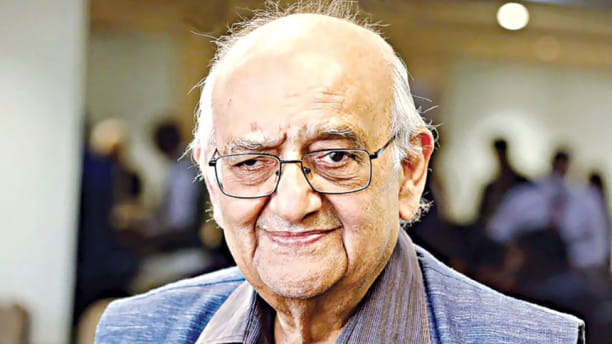Reforms implementation: Yunus should have invested his authority

Eminent economist Prof Rehman Sobhan has said reforms not yet initiated and operationalised may remain unimplemented in the end.
"If they are going to be put into process even in the course of the next week or the next 10 days or the next 10 weeks, possibilities of these reforms being legislated and operationalised are not very high," he said.
He was speaking at an online discussion titled "Political Economy of Economic Reforms in Bangladesh: Promises, Obstacles and Realities". Shomaj Gobeshona Kendro organised the discussion that started on Saturday night and continued for four hours till 1:00am yesterday.
Sobhan, chairman of the Centre for Policy Dialogue (CPD), said Chief Adviser Prof Muhammad Yunus is recognised in the global community as a Nobel laureate, which gives him significant authority to carry out reforms.
He said Yunus should have invested his authority behind a set of reforms that he could realistically initiate and bequeath to the next government.
But Yunus and his government have not done that, the economist said. The task has instead been left to a small group of civil society members, who have been given the extraordinary challenge of distilling reform proposals coming from 10 commissions, said Sobhan.
He said the commissions were given no terms of reference. "So, there was really no coordination or cohesion in that reform, nor an underlying set of priorities or even an ideological premise to what you want to carry on."
Each commission worked out its own ideas in its own sector, he said.
The small group of civil society members was then handed the major task of bringing together the political parties to reach a settlement on what reforms they would commit to, he added.
"We are now operating in a very specific context of a caretaker government, which has probably another six months left before they are committed to holding elections and transferring power to an elected government."
"So, the discussion should relate to what they are going to do and what outcomes may emerge over the next six months."
The consensus commission is headed by Yunus himself but its task on so many reform proposals is actually being carried out by Prof Ali Riaz and a few others, Sobhan said.
"The problem over there is that Ali Riaz and his colleagues have been entrusted with the responsibility of bringing in a settlement amongst a collection of political parties, where the representative status is highly uneven and where major political parties have been initially excluded from the process.
"Are they going to simply make deals that 'you kindly put your signature to the proposals and then we will show that this has become a Sanad [July Charter] and we will then be able to move on after that'?" he said.
In that case, Sobhan said, "We will have to depend now exclusively on the elected government to determine which reforms can be carried out. We will see what happens when an elected government comes into office, if they are drawn to tradition -- their problem will be that they've been hungry for 16 years.
"Whether they will be inclined to look after their deprivations in the initial period before they begin reforms is to be seen."
Regarding financial sector reforms, he said those being talked about are "governance reforms" in reality.
Sobhan said a list of 2,000 defaulters seeking loan rescheduling has been made and a panel has been formed to find out whose applications are acceptable on "very easy terms".
"This is exactly a process which was twice initiated under the Hasina regime by successive governors of the Bangladesh Bank.
"Now this essentially means that this culture, which was put in place in the first BNP government under Ziaur Rahman and was perpetuated under successive regimes throughout and reached its apotheosis under Hasina when she was in power for 16 years, has created a major structural problem for the banking system," he said.
Prof Selim Raihan, executive director of the South Asian Network on Economic Modeling (SANEM), presented a paper at the event.
He said two important reports -- the white paper and the task force committee report -- highlighted gross anomalies in past governance and laid out detailed recommendations on reform.
However, these efforts have not translated into a coherent reform drive, Raihan said.
"Reform remains piecemeal. There has been no clear drive or mobilisation in terms of reforms. Whatever the government has done is fragmented," he said.
Prof Mustafizur Rahman, a distinguished fellow of the CPD, said reforms cannot be done at a time, but since peoples' expectation is huge, it may be embedded in the political system in future if democracy and progressive political system are ensured.
Hossain Zillur Rahman, executive chairman of Power and Participation Research Centre (PPRC), Birupaksha Paul, a former chief economist of Bangladesh Bank, Prof Rounaq Jahan, a CPD trustee, also spoke at the discussion. Economists Prof Nazrul Islam, Prof MM Akash, Syed Akhtar Mahmood and Rushidan Islam also participated in the event.



 For all latest news, follow The Daily Star's Google News channel.
For all latest news, follow The Daily Star's Google News channel.
Comments